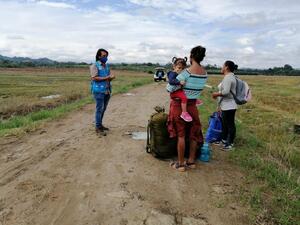Access to jobs improving for Syrian refugees in Jordan
Access to jobs improving for Syrian refugees in Jordan
UNHCR welcomes a series of recent measures by the Government of Jordan that could significantly ease the way for Syrian refugees to find legal employment, going a long way to help them become more self-sufficient. This could see up to 78,000 Syrians able to work legally in Jordan in the short term and thousands more in the coming years.
The most recent of these new measures, launched earlier this month, is a 90-day grace-period that allows employers in the informal sector to freely obtain work permits for Syrian refugees, regularizing their employment. This potentially puts Syrian refugees on the same footing as migrant workers who are allowed to work in jobs such as construction, agriculture, the service industry, food and beverages, wholesale and some factories.
The temporary waiver of fees (which range between US$170 to US$1,270 depending on the sector) is an important reprieve: Many Syrian refugees have been sinking into poverty as the war at home drags on, increasing the risk that they would work illegally. For employers of Syrians, the new grace period also allows them to legalize workers and avoid steep fines of between US$280 and US$2,100 which were imposed previously and have seen the closure of some 70 businesses to date.
Since the beginning of March, Jordanian authorities have also allowed Syrian refugees to use UNHCR-issued asylum-seeker cards and Jordanian Ministry of Interior identity cards to obtain work permits. Previously, the only way to do so was using a passport and proof of legal entry into the country. As most Syrian refugees lack passports and proof of legal entry status, many were precluded from having jobs. Authorities have now removed that requirement, paving the way for thousands more Syrians to be legally employed.
UNHCR has long been advocating for more support to Jordan and other key refugee hosting countries, including better access to development funds and low interest loans. And, a major factor in supporting Jordan's new measures, is the World Bank's commitment to provide Jordan with near zero per cent loans of US$300-500 million tied to indicators like the granting of work permits to Syrian refugees.
These efforts to increase livelihood opportunities for Syrian refugees also follow February's London conference on the Syria crisis. This focused on the dire need to increase access to work and education opportunities for Syrians, including through boosting partnerships with the private sector to allow refugees and local communities to share in economic progress.
UNHCR is also playing a part in improving access to labour for refugees, and earlier this month launched a pilot project to help 2,000 Syrians get jobs in the export garment sector, as a partner of the 'Better Work Jordan' programme run by the International Labour Organisation. We are also running weekly job fairs for Syrian refugees in community centres close to the relevant industrial zones, including in Irbid and Zarqa. The first refugees are expected to start work in garment factories next week.
We believe the combined effort of these various initiatives will go a long way to help Syrian refugees become more sufficient and bring economic benefits to Jordan, which has felt the macro-economic consequences of a region in flux and the heavy cost of fighting in Syria. As the Syrian crisis drags on, there is an urgent need to improve conditions and stability for the increasingly aid-dependent refugees.
Over 640,000 Syrian refugees are registered with UNHCR in Jordan, with more than 85 per cent living outside of camps. A recent study showed nine out of 10 Syrians living outside camps live below the Jordanian poverty line of JOD68 (US$87) per capita per month.
For more information on this topic, please contact:
- In Amman, Helene Daubelcour, +962 79 889 1307 [email protected]
- In Amman, Aoife McDonnell, +962 79 545 0379 [email protected]
- In Geneva, Ariane Rummery, +41 79 200 7617 [email protected]









